Unit9_Have you ever been to a museum SectionB公开课课件
人教版新目标Unit9_Have_you_ever_been_to_a_museum全单元

TALK
neither have I = me neither .
I have been to the zoo a lot of times. 答语
______________ .\
. ( 我也是)
I’ve never been to a water park. 答语
____________ \ _______ . ( 我
• 1 h过某地(去过已回来);
• 2 have / has gone to +地名 去了某地(还没回来);
• 3 have / has been in +地名 在某地住了有多长。
• A: Have you ever been to the Great Wall? • B:Yes, I have. What about you? • A: Me too. • =So have I. • =I have ever been there, too. • So+助动词/be动词/情态动词+主语.
4. A: How about __g_o_i_n_g___ (go) to the art museum? There are some special German paintings there right now.
B: Sure. When do you want _t_o_g_o___ (go) ? 5. A: Have you ever __v_is_i_te_d___ (visit) the
• A: Have you ever been to the Great Wall? • B: No, I haven’t. What about you? • A: Me neither. • =Neither have I. • =I haven’t been there, either. • Neither+助动词/be动词/情态动词+主语.
Have you ever been to a museum 全单元教案
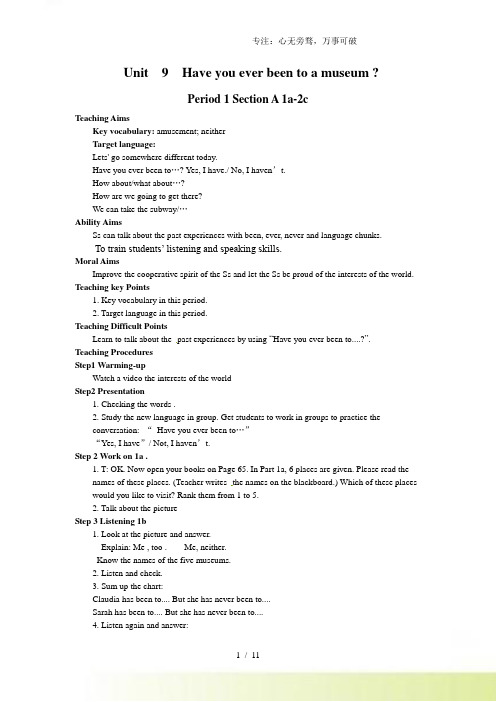
Unit 9 Have you ever been to a museum ?Period 1 Section A 1a-2cTeaching AimsKey vocabulary: amusement; neitherTarget language:Lets' go somewhere different today.Have you ever been to…? Yes, I have./ No, I haven’t.How about/what about…?How are we going to get there?We can take the subway/…Ability AimsSs can talk about the past experiences with been, ever, never and language chunks.To train students’ listening and speaking skills.Moral AimsImprove the cooperative spirit of the Ss and let the Ss be proud of the interests of the world. Teaching key Points1. Key vocabulary in this period.2. Target language in this period.Teaching Difficult PointsLearn to talk about the past experiences by using “Have you ever been to....?”.Teaching ProceduresStep1 Warming-upWatch a video the interests of the worldStep2 Presentation1. Checking the words .2. Study the new language in group. Get students to work in groups to practice theconversation: “Have you ever been to…”“Yes, I have”/ Not, I haven’t.Step 2 Work on 1a .1. T: OK. Now open your books on Page 65. In Part 1a, 6 places are given. Please read thenames of these places. (Teacher writes the names on the blackboard.) Which of these places would you like to visit? Rank them from 1 to 5.2. Talk about the pictureStep 3 Listening 1b1. Look at the picture and answer.Explain: Me , too . Me, neither.Know the names of the five museums.2. Listen and check.3. Sum up the chart:Claudia has been to.... But she has never been to....Sarah has been to.... But she has never been to....4. Listen again and answer:When did Sarah visit the National Science Museum?A. TodayB. YesterdayC. Last year2. When did Claudia visit the nature museum?Last year B. Last summer C. Last school trip3. What may the relationship be between the two speakers?A. FriendsB. Teacher and studentC. Mother and kid.Listen and repeat.5 .Follow the tape.Step 4 Pair work.1. Example :A: Let’s go somewhere different today.B: OK. Where do you want to go?A: Have you ever been to the spacemuseum?B: No, 1 haven’t. How about you?A: A: Me neither. / Neither have I.2. Students work.Step 5 Listening (2a 2b)1. Talk about the pictures by using “Have you ever been to...?” and “How did you go there?”2. Ss listen and circle the places.3. Check.4. Read and translate the sentences in 2b.5. Listen and circle “T” or “F”.6. Check.7. Read the listening passage and correct the mistakes.Step 6 work on 2c.Look at the map in 2a and make conversations about the places.A: Have you ever been to the space museum?B: Yes, I have. How about you?A: No, I haven’t.B: Oh, it’s fantastic. Let’s go tomorrow.A: OK. How are we going to get there?B: We can take the subway.Step 7 Homework.Period 2 Section A 2d & GrammarTeaching AimsKey vocabulary: camera; invention ;a couple of ; German; theme; ride; provinceTarget language:It’s a great way to spend a Saturday afternoon.I learned about the inventions that led to color movies, too.Have you ever been to a science museum?Yes, I’ve been to a science museum./No, I’ve never been to a science museum.Have you ever visited the space museum?Yes, I have. I went there last year./No, I haven’t.I’ve been to the art museum many times.Me, too. And I’ve also visited the nature museum.Teaching Key PointsThe present perfect tense.How to use the present perfect tense.Teaching DifficultiesTo understand and use the present perfect tense.Teaching procedures:Step 1 : Review.Show the pictures and ask and answer:Have you ever been to .....?Yes I have. /No, I haven’t./No, never.\ Not yet.Step 2 Work on 2d.1. Learn the words.2. Listen and choose: What’s it about?A: About their clothes.B: About the food.C: About their last weekend.3. Scan(寻读) the conversation and answer the following questions.4. Listen and imitate5.Role-play conversationStep 3 Grammar.1.Ask students to read the sentences of Grammar focus aloud.2. Explain. Learn the Present Perfect TenseStep 4 Work on 4a.1. Finish 4a on textbook. Put the correct form of the verbs in the blanks.2. Check the answer.Step 5 Work on 4b.1. Finish 4b on textbook. Fill in the blanks with the correct forms of the verbs in brackets.2. Check the answer.Step 5 Work on 4c.Finish 4c on textbook. Answer the survey questions and then ask your partner.Make a survey:What fun places have your classmates been to ?How did they get there?Write a report according to their charts.Today I asked our classmates about their journey. Here are the results.__________________________________________Step 6 Homework.Period 3 Section A (3a-4c)Teaching AimsKey vocabulary:unbelievable, progress, rapid, unusual, toilet, encourage, social, peaceful, performance, perfect, itself, collectTarget language:I wonder how much more computer will be able to do in the futureWatching them prepare the tea with the beautiful tea sets is just as enjoyable as drinking the tea itselfI’ve also learned that there was a special computer.Ability Aims1.Ss can understand the passage,to train students’reading ability2. To get students know some knowledge about many kinds of museums.Moral AimsTo raise students’interest of learning English.Teaching key Points1. Key vocabulary:2. Target language:Teaching Difficult Points1.How to improve reading skill.2. To understand the passage and the culture.Teaching ProceduresStep1 Warming-upStep 1, Free talkAsk Ss to talk about some places.A: Have you ever been to…?B: Yes, I have. I went there last…/ No, I haven’t. How about you?A: Me too./ So have I. I went there …/ Me neither./Neither have I.Step 2, pre-readingShow Ss a picture about a museum ,ask Ss to guess what kind of mesuem it is.Show Ss pictures for new words .Step 3, While reading1.skimming.Give Ss 1 or 2 minutes to ask them to read the passage quickly and answer the question.Which three museum do you think about ?What do they think of the museums?2. Careful readingA .Read Para. 1 to answer the 2 questionsWhat is Ken interested in in the American Computer Museum?Answer like this: Ken is interested in _________.B . Read Para 2 to answer the 2 questionsWatch video 1 ,what do you think of the museum?Watch video 2, what can you learn from the video?Read paragraph 2, and answer:Why does Amy think the museum is unusual ?What has Amy learned at the International Museum of Toilets?C . Read Para.3 to answer the following questionsWatch the video, and compare, which sentence is better,why ?The tea art performances show how to make a perfect cup of tea with beautiful tea sets.The tea art performances show how to make a cup of tea with tea sets.What does Linlin think of the tea performances and the tea drinking?3. Enjoy reading.What do you think is the most interesting museum ?Read the sentences you like in 3a with your feelings.Step 3 post reading -- Work on 3c.Ask Ss to finish 3c by themselves , then check the answers.Step 4 Homework.1.Level A: Listen and read the passage.2. Level B: Talk about your favorite museum and write it down.Period 4 Section B 1a-1dTeaching AimsKey vocabulary:the Terracotta Army; the Great Wall; the Bird’s Nest;the Palace MuseumTarget language:Have you visited …?Have you been to …?Have you seen …?Have you tried …?Ability AimsTo train students’ listening and speaking skills..Moral AimsTo raise students’interest of learning English.Teaching Key Points1. Key vocabulary in this period.2. Target language in this period.Teaching DifficultiesImprove students’ listening.Teaching ProceduresStep1 Warming-upHave you ever been anywhere interesting in Beijing?Have you ever been anywhere interesting outside Beijing?Learn the phrases: the Terracotta Army; the Great Wall; the Bird’s Nest;the Palace Museum Read these places of interestStep 2 Work on 1a.1.Finish exercise 1a on textbook. Match the pictures with names.2. Check the answers.Step 3 Listening1. work on 1b.Listen to a student interviewing a foreign student. Check (√) the question you hear.Check the answers.2. Work on 1c.Listen again and take notes.Check the answers.3. post listening.Complete the sentences about Peter’s visit in China.Peter has been in China for _____ weeks.Peter went to ___________________ last week.When Peter visited the Great Wall, he saw many ________ there.Peter said that the Terracotta Army was __________.____________ is Peter’s favorite Chinese dish.Step 4 Pair work,1. demonstrate:How long have you been in China?Have you visited the Palace Museum?Have you been to the Great Wall?Have you tried Chinese food?2. Work in pairs to ask your partner where she/he has been to?Have you visited …?Have you been to …?Have you seen …?Have you tried …?Step 5 self check.1. self check 1.Think about the things below and write an answer for each one.Check the answers.2.self check 2.Check the answers.Step 6 Homework.Teaching Aims:Key vocabulary:quarter; fear; Indian; dark; fox; whenever; equator; island; whether; English-speaking ;take a holiday; three quarters; all year round;Ability AimsTry to develop the st udents’ abilities of reading and writing.Train students’ integrating skills.Train students’ reading comprehension and cooperation spirit.Teaching Key PointsNew words and key phrases.Understand the passage correctly .Teaching DifficultiesHow to describe a place.How to take notes about a passageMoral object:Be interested in knowing about the culture of foreign countries.Teaching ProceduresStep 1 Warm up.1. Play a song before class.2. Greet the class and ask the students if they know the name of the song. (Traveling light).3. Ask the students if they like traveling or not. If they plan to travel to some place, Wheredo they want to go?Step 2 before reading1. Show the symbol (Merlion) of Singapore and ask the students if they know the city, thenshow some pictures of Singapore2. Read the title: From the title , we can infer Singapore is a __________ place.Step 3 while reading .1.Fast reading What four aspects(方面)of Singapore are mentioned?2.Careful reading of each paragraphDiscussion: How many reasons can you find for visiting Singapore.(underline them in each paragraph)3. Task 2. Read the article and use the information to correct the wrong sentences.4. Fill in the conversation about Singapore using the information from the article.Step 4 Post-reading.Make notes about Singapore. Write down anything that you remember. Do not look atthe article.Step 5 HomeworkLevel 1. Introduce Singapore to your parents.Write sth about the hometown or a place the students like.Teaching Aims:Target language.Have you ever tried/seen/been…?If you…, you will/can…You should…One great thing about …is…Ability AimsTo train students speaking and writing abilities.Teaching Key PointsTarget language in this period.Teaching DifficultiesImprove students’ writing ability.Teaching ProceduresStep 1 RevisionWhat do you know about Singapore?Step 2 Work on 3a.Make a list of facts about your hometown or a place you have been to. Think aboutthese topics.1. Pre-writingSize and location:_________________Population:_______________________Weather:________________________History:_______________________Places to visit:___________________Things:___________________________2. example:A: Hainan IslandHave you ever tried/seen/been…?Have you ever been to Hainan Island?I have been there only once before, and I want to go there again.But I know it is thesecond largest island in China. It’s a fantastic place.If you go there, you should walk along the beaches and enjoy the sunshine.The weather in Hainan is very hot, so people like doing many water sports, such as scubadiving (潜水), fishing, swimming, surfing and boating.One great thing about Hainan is that you can try many kinds of sweet fruit in Hainan.If you go to Hainan, I’m sure you will enjoy yourself.Step 3 Work on3b.Write an article to advertise your hometown or a place you have been to.Useful language:Have you ever tried/seen/been …?If you …, you will/can …You should …专注:心无旁骛,万事可破One great thing about … is …Another example:I have been to Beijing, the capital of China. As the capital of the PRC,Beijing is located in northern China.The city covers an area of more than 16,410 square kilometers and has a population of 14.93 million.If you go to Beijing, you should try Beijing Duck because it is very delicious. If you go to Beijing in winter, you should wear warm clothes because it can get very cold.One great thing about Beijing is that there are a lot of historical places to visit, such as the Great Wall and the Summer Palace.They are all very interesting places!Step 4 Homework .1.Revise the language points.plete your article in 3b.11 / 11。
Unit-9-Have-you-ever-been-to-a-museumSection-A
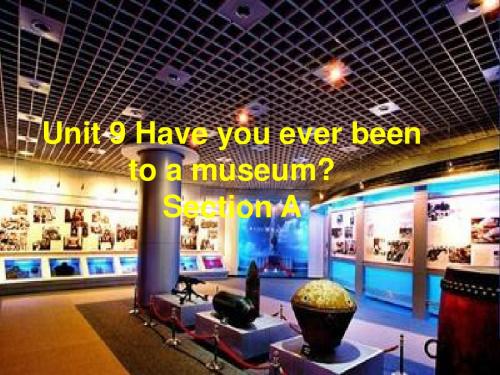
place. I !
Show Time!
1.Write an article about the most interesting place you have ever been to.
Protect the environment Save the earth
history museum
Use the following sentences to make a short conversation one by one . (注:以四人
为一小组,第一位问第二位,第二位回答后用相同的句 式问第三位,依次进行。但每小组中地点不能重复) A: Have you ever been to the space museum? B: Yes, I have.I have ever been to… No, I haven’t.I have never been toe museum (科技馆)
an art museum (美术馆)
What kinds of parks do you know ?
an amusement park (游乐园)
a water park (水上乐园)
a history museum
Sarah √
√
√
√ √
√
Listening 2 2a
Look at the map of the town. Listen and circle the places you hear.
Listening 2 2b Listen again and circle T for true or F for false. Conversation 1 1. Tina went to the space museum last year. T/F 2. John has never been to the space museum. T/F 3. They are going to take the subway. T/F
_unit_9_Have_you_ever_been_to_a_museum

现在完成时态中: have been to和have gone to都是指已经 去了某个地方,但是have been to强调 的是曾经去了某个地方并回来了; have gone to强调的是去了某个地方还 没有回来。
【运用】 选用have gone to或have been to完成下 列句子(注意形式变化)。
Have you ever been to a museum?
SectionA1a-2d
Summer vacation is coming,
Where do you want to go? I want to go… Do you want to go to…?
GUESS
Guilin 你曾经去过 某地吗?
T F
Conversation 3
Harvey had a great time at Water World.
T F
T F ○
John has never been to the space museum.
T F
Linda went to the zoo three times last year.
太空博物馆
历史博物馆
Me neither.(Neither have I.\I haven’t been to a history museum,either)我也不 注意:neither (adj.\pron.\adv.\conj.)两者都不(的), 也不 (1) neither +n.单数 (2)作主语视为单数,(三者或以上)都不none (3) “….也不 ”放句首构成部分倒装 Neither+助\be\情+s(主) .…也不. So +助\be\情+s(主) …..也 (4) Neither. ….nor…既不…也不… 连接同一性 质的单词和短语。作主语时,谓语动词要就近原 则
(完整版)优秀课件unit-9-Have-you-ever-been-to-a-museum

zoo
A: Have you ever been to a zoo? B: Yes, I’ve been to a zoo.
space museum 太空馆
A: Have you ever been to a space museum? B: No, I’ve never been to a space museum.
6.He has been in London for half a month. 他来伦敦已有半个月了。
1.sb.have /has been to sp. 意为“某人曾经去过某地”,
但现在已不在那里了, ”已经回来,侧重指经历,后 可接次数, 如once, twice, three times等, 表示 “去过某地几次”, 也可和 just, never, ever等连用。
4.我了解了一些电影的知识。 I _le_a_r_n_e_d_a_b_o_u_t_ some information about movie. 5.他的粗心导致了这次失败。 His carelessness _l_e_d_ _t_o_ this failure.
选用have, has填空: 1.I __h__a_v_e_ told him the news. 2.She ___h_a_s___ come back from school. 3.You ___h_a_v_e__ won the game.
2.sb.have/has gone to sp.
意为“某人已经去某地了”, 可能在去某地的路上, 也可能到达了某地。总之, 说话时该人不在现场, 一般不用第一人称、第二人称代词作句子的主语。
3.sb.have/has been in sp.
表示“在某地呆了多少时间”, 常与时间段状语连用
Unit-9--Have-you-ever-been-to-a-museum--知识整理
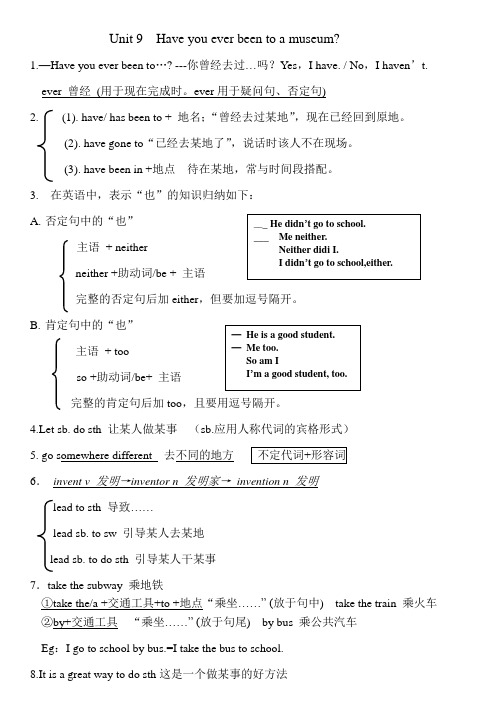
Unit 9 Have you ever been to a museum?1.—Have you ever been to …? ---你曾经去过…吗?Yes ,I have. / No ,I haven ’t. ever 曾经 (用于现在完成时。
ever 用于疑问句、否定句)2.(1). have/ has been to + 地名;“曾经去过某地”,现在已经回到原地。
(2). have gone to “已经去某地了”,说话时该人不在现场。
(3). have been in +地点 待在某地,常与时间段搭配。
3. 在英语中,表示“也”的知识归纳如下:A. 否定句中的“也”主语 + neitherneither +助动词/be + 主语 完整的否定句后加either ,但要加逗号隔开。
B. 肯定句中的“也”主语 + tooso +助动词/be+ 主语 完整的肯定句后加too ,且要用逗号隔开。
4.Let sb. do sth 让某人做某事 (sb.应用人称代词的宾格形式)5. go somewhere different 去不同的地方 6. invent v 发明→inventor n 发明家→ invention n 发明lead to sth 导致……lead sb. to sw 引导某人去某地lead sb. to do sth 引导某人干某事7.take the subway 乘地铁①take the/a +交通工具+to +地点“乘坐……” (放于句中) take the train 乘火车 ②by+交通工具 “乘坐……” (放于句尾) by bus 乘公共汽车Eg :I go to school by bus.=I take the bus to school.8.It is a great way to do sth 这是一个做某事的好方法9. go skating 去滑冰10. .on the weekend 在周末11. science museum 科学博物馆history museum 历史博物馆12.all the old movie cameras所有的古老的电影摄影机13.camp in the mountains 在大山里露营14.learn about 了解获知,得知learn about sth.了解有关……的情况15. an amusement park 一个游乐场16. the International Museum国际博物馆17. put up a tent 搭帐篷put up 搭起;举起;张贴rmation信息;资料(不可n.)some informationa piece of information 与about 连用,表示:“关于……的信息”19.It’s unbelievable that+从句“令人难以置信的……”20. make progress 取得进步make progress in 在......方面取得进步21.in such a rapid way 以如此迅猛的方式22.play chess 下棋23.be able to+V原能够做某事24.in the future在将来25.wonder 想要知道= want to know①后接从句eg:I wonder who she is.②也可接“疑问词+不定式”eg: I wonder what to do next.26.I couldn’t believe my eyes我无法相信我的眼睛。
八下新目标英语Unit_9_Have_you_ever_been_to_a_museum?

【2012贵州贵阳】 “Have you ever been to Tokyo?” “Yes, I ______ there twice. It’s a modern city.”
A. have gone B. have been C. had gone
【答案】B
考查动词时态及动词的用法。问句用的是现 在完成时,答句也应该用现在完成时,前后 时态一致。have gone意为“去过,但还没回 来”;have been意为“去了,回来了”。根 据句意:你去过东京吗?我去过两次,它是 一个现代城市。故选B.
the final.
— I think so. He ________ for it for months.
A. is preparing
B. was preparing
C. had been preparing
D. has been preparing
2. By the time he realizes he _________ into a
D. Did; show
8. — Hi, Tracy, you look pale.
— I am tired. I ______ the living room all day.
A. painted
B. had painted
C. have been painting D. have painted
C. considered D. is going to consider
7. —______ you ______ him around the museum
yet?
—Yes. We had a great time there.
A. Have ; shown
人教版 八年级英语 下册 Unit_9_Have_you_ever_been_to_a_museum

dish.
Tapescripts:
Boy 1: So, Peter, how long have you been in China? Peter: I’ve been here for two weeks, but I’m going back to Australia tomorrow. Boy 1: Have you traveled much? Peter: Yes, I have. I’ve seen many interesting things. Boy 1: Have you visited the Palace Museum? Peter: Yes, I have. I went there last week. It was wonderful. There were so many beautiful treasures. Boy 1: And have you been to the Great Wall?
1st listening
1b
Listen to a student interviewing a foreign student. Check (√) the questions you hear.
___√_ Have you visited the Palace Museum?
___√_ Have you been to the Great Wall?
unit9haveyoueverbeentoamuseum教案
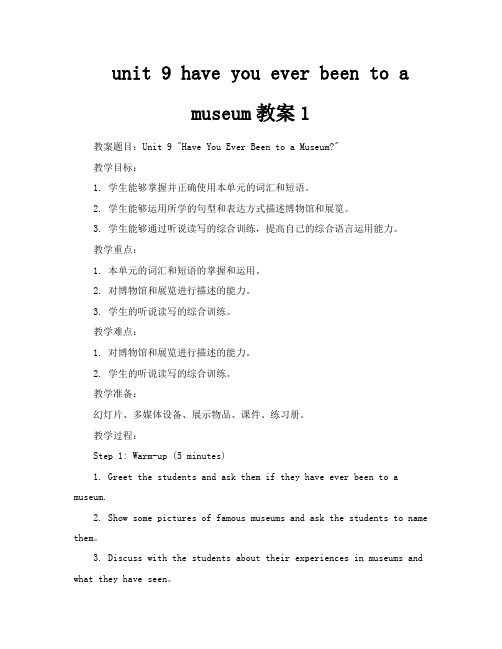
unit 9 have you ever been to amuseum教案1教案题目:Unit 9 "Have You Ever Been to a Museum?"教学目标:1. 学生能够掌握并正确使用本单元的词汇和短语。
2. 学生能够运用所学的句型和表达方式描述博物馆和展览。
3. 学生能够通过听说读写的综合训练,提高自己的综合语言运用能力。
教学重点:1. 本单元的词汇和短语的掌握和运用。
2. 对博物馆和展览进行描述的能力。
3. 学生的听说读写的综合训练。
教学难点:1. 对博物馆和展览进行描述的能力。
2. 学生的听说读写的综合训练。
教学准备:幻灯片、多媒体设备、展示物品、课件、练习册。
教学过程:Step 1: Warm-up (5 minutes)1. Greet the students and ask them if they have ever been to a museum.2. Show some pictures of famous museums and ask the students to name them。
3. Discuss with the students about their experiences in museums and what they have seen。
Step 2: Presentation (15 minutes)1. Present the new vocabulary and phrases related to museums and exhibitions using flashcards or pictures。
2. Introduce the target language structures through a short dialogue between a student and a teacher, using phrases like "Have you ever been to a museum?" and "What did you see there?"3. Model the pronunciation and intonation of the target language structures and have the students repeat after you。
Unit_9___Have_you_ever_been_to_a_museum过关
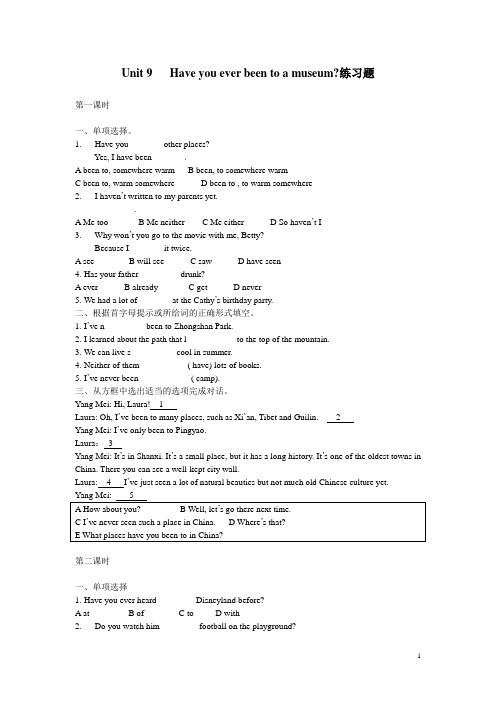
Unit 9 Have you ever been to a museum?练习题第一课时一、单项选择。
1.--- Have you _______ other places?--- Yes, I have been _______.A been to, somewhere warmB been, to somewhere warmC been to, warm somewhereD been to , to warm somewhere2.--- I haven’t written to my parents yet.--- _________.A Me tooB Me neitherC Me eitherD So haven’t I3.--- Why won’t you go to the movie with me, Betty?--- Because I _______ it twice.A seeB will seeC sawD have seen4.Has your father ________- drunk?A everB alreadyC getD never5.We had a lot of _______ at the Cathy’s birthday party.二、根据首字母提示或所给词的正确形式填空。
1.I’ve n_________ been to Zhongshan Park.2.I learned about the path that l___________ to the top of the mountain.3.We can live s__________ cool in summer.4.Neither of them __________ ( have) lots of books.5.I’ve never been ___________ ( camp).三、从方框中选出适当的选项完成对话。
Unit9-Have-you-ever-been-to-a-museum知识点梳理及单元复习
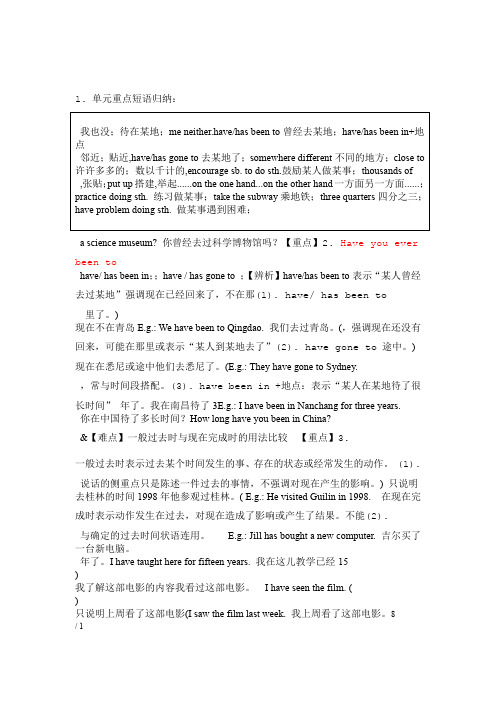
1. 单元重点短语归纳:a science museum? 你曾经去过科学博物馆吗?【重点】2. Have you everbeen tohave/ has been in;;have / has gone to ;【辨析】have/has been to表示“某人曾经去过某地”强调现在已经回来了,不在那(1). have/ has been to里了。
)现在不在青岛E.g.: We have been to Qingdao. 我们去过青岛。
(,强调现在还没有回来,可能在那里或表示“某人到某地去了”(2). have gone to 途中。
)现在在悉尼或途中他们去悉尼了。
(E.g.: They have gone to Sydney.,常与时间段搭配。
(3). have been in +地点:表示“某人在某地待了很长时间”年了。
我在南昌待了3E.g.: I have been in Nanchang for three years.你在中国待了多长时间?How long have you been in China?&【难点】一般过去时与现在完成时的用法比较【重点】3.一般过去时表示过去某个时间发生的事、存在的状态或经常发生的动作。
(1). 说话的侧重点只是陈述一件过去的事情,不强调对现在产生的影响。
) 只说明去桂林的时间1998年他参观过桂林。
( E.g.: He visited Guilin in 1998. 在现在完成时表示动作发生在过去,对现在造成了影响或产生了结果。
不能(2).与确定的过去时间状语连用。
E.g.: Jill has bought a new computer. 吉尔买了一台新电脑。
年了。
I have taught here for fifteen years. 我在这儿教学已经15)我了解这部电影的内容我看过这部电影。
I have seen the film. ()只说明上周看了这部电影(I saw the film last week. 我上周看了这部电影。
Have you ever been to a museum_知识点汇总-人教版英语八年级下册

Unit 9 Have you ever been to a museum?一、短语归纳1.science museum科学博物馆2.history museum历史博物馆3.space museum 太空博物馆4.art museum美术馆5.water park水上公园6.amusement park游乐场7.somewhere different某个不同的地方8.have a great time玩得高兴9.take the subway乘地铁10. learn about了解11.put up搭建;支起12. color movies彩色电影13. a great way to do sth一个做某事的好方式/好方法14.in such a rapid way用如此快速的方式15.It’s unbelievable that:很难相信16.be able to do sth能够做某事17.think about 考虑18.many different kinds of许多不同种类的19. in the future在将来未来20. a couple of 少数;几个21.a perfect cup of tea一杯完美的茶22. something important重要的东西23.thousands of数以千计的24. watch sb. do sth观看某人做了某事25.want to do sth想要做某事26.encourage sb. to do sth鼓励某人做某事27.love doing sth喜欢做某事28.see sb doing sth看见某人正在做某事29.the best time to do sth做某事的最佳时间30.have problems (in) doing sth做某事有困难31. choose to do sth选择做某事32. tell sb. to do sth告诉某人做某事33.take a holiday度假34. at night 在晚上35. more than 超过;多于36.three quarters 四分之三37. on the one hand…on the other hand 一方面…另一方面38. an English-speaking country一个说英语的国家39. during the daytime 在白天40. wake up 醒来41. all year around一年到头42.close to靠近43. far from离…远44. the Great Wall长城45.the best time to do sth做某事的最好方式考点归纳考点1 辨析:have/ has been to have gone to have been in⑴have/ has been to + 地名“曾经去过某地” , 现在已经回到原地。
八年级英语下册Unit9Haveyoueverbeentoamuseum知识点汇总(带答案)

八年级英语下册Unit9Haveyoueverbeentoamuseum知识点汇总单选题1、— Have you ever ________ an amusement park?— Yes, I have. I ________ Fun Times Amusement Park three years ago.A.gone to; went toB.been to; went toC.been to; gone toD.been in; went to答案:B句意:——你曾经去过一个游乐场吗?——是的,我去过。
我三年前去过趣味时光游乐场。
考查have gone to和have been to的区别以及一般过去时。
have gone to+地点“去某地还未归”;have been to“去某地已回来”,根据“three years ago.”可知已回来,所以第一空应填been to;根据“three years ago.”可知此句应为一般过去时,所以谓语应填过去式,而go为不及物动词,后续宾语要用介词to,故选B。
2、They didn’t know ________ they should tell the police or not.A.ifB.whereC.whoD.whether答案:D句意:他们不知道他们是否应该告诉警察。
考查宾语从句连接词。
if是否;where什么时候;who谁;whether是否。
根据“or not”可知此处是whether...or not结构,故选D。
3、 of the students in our class going to the summer camp in Beijing next week.A.Two fifths; isB.Second fifths; areC.Second fifths; isD.Two fifths; are答案:D句意:我们班五分之二的学生打算下周去北京参加夏令营。
Unit 9Unit_9_Have_you_ever_been_to_a_museum B selfcheck

2 Complete the conversation
A: Hey, John.________ What are you doing this weekend? B: Not much, Mark. I don’t really have any plans yet. A: _______ Have you ever been to the space museum? B: ______, last month. Yes I have. I __________there went about it? A: Oh, how _________
在东南亚
尝试新食物 西餐
夜间野生动物园
似乎很奇怪 天黑 在白天 如此特殊 醒来 做某事的最好时间 一个更自然的环境
try new food western food Night Safari seem strange It’s dark. during the daytime so special wake up It’s the best time to do…. a more natural environment
did something new there. I ________ not see it
last time.
A: Perfect!
3 Complete the chart.
Have you ever been to a/an ... home for old people? farm? amusement park? How many times? What did you see/do there?
东南部; 东南的
极好的 人口 四分之一 害怕, 担心 卓越的 夜间野生动物园
- 1、下载文档前请自行甄别文档内容的完整性,平台不提供额外的编辑、内容补充、找答案等附加服务。
- 2、"仅部分预览"的文档,不可在线预览部分如存在完整性等问题,可反馈申请退款(可完整预览的文档不适用该条件!)。
- 3、如文档侵犯您的权益,请联系客服反馈,我们会尽快为您处理(人工客服工作时间:9:00-18:30)。
places to visit
weather
Singapore — A Place You Will Never Forget!
Have you ever been to Singapore?... so you can simply speak Putonghua a lot of the time. On the other hand, Singapore is an English-speaking country, so its also a good place to practice your English!
d) seem to do. e.g. He seems to be happy. 他好像很高兴。 My mother seemed to know that. 我妈妈好像知道那件事。 e) It seems that + 从句 e.g. It seems that he is happy. = He seems (to be) happy. 他好像很快乐。
Translate the following phrases.
1. 在东南亚 _______________ in southeast Asia 2. 四分之三人口 three ________________________ quarters of population 3. 做某事有困难 have ______________________ problems doing sth. 4. 在白天 during ________________ the daytime wake up 5. 睡醒 ________ 6. 处于一个自然的环境中 in a natural environment ______________________ all year round 7. 一年到头,终年 _____________
zoo
temperature
2b Fill in the blanks according to the article.
Chinese English nguage:____________and___________ new 2.food:________food Chinese and_______food(such Indian Western as_______food,_______food, or _________food) Japanese Night Safari and you can go 3.zoo:There is a ___________, at night ________________ the same all year round 4.temperature: It’s almost ___________________
daytime because they will probably be awake.
at night
4. It’s best to visit Singapore in the autumn.
whenever you like
2d Fill in the conversation about
Singapore using the information form the article. A: I am going to Singapore next week. _____ Have you ever been ____ there before? B: Yes, I’ve ____ been to Singapore many times. SoutheastAsia. It’s my favorite country in ________ speak there? A: What languages do people _____ B: Mostly Chinese and _______. English
equator n.赤道 Singapore is in Southeast Asia 东南亚 It is close to the equator [ɪ‘kweɪtə]
More than three quarters of the population are Chinese. n. 四分之三
language
Singapore
food places to visit weather
thousand num.
一千
thousands of
数以千计的
safe adj.
fear v. & n.
安全的
害怕;惧怕
Japanese adj.
language food
Have you ever tried Chinese food outside of China? … Whether you like Indian food, Western food or Japanese food, you’ll find it all in Singapore! Most large cities have zoos, but have you ever been to a zoo at night? Singapore has a Night Safari … At the Night Safari, you can watch these animals in a more natural environment than in a normal zoo. One great thing about Singapore is that the temperature is almost the same all year round…of course, it’s not too far from China!
A: What about the food? Is it good? B: It’s excellent! _____ Have you ever tried Indian food? Indian food is really good in Singapore. A: I see. Have you ____ ever heard of the Night Safari? Someone told me to go there. B: Yes! I ____ have been to the Night Safari. It was really exciting to ___ see the animals in the dark. A: And it is always _____ warm in Singapore? year round! It’s always summer there! B: All ____
What do you know about Singapore now? language people location
Singapore
food
places to visit
weather
Make notes about Singapore. Write down anything that you remember. Do not look at the article ________________________________________________ language: ________________________________________________ food: ________________________________________________ places to visit: temperature: ________________________________________________ ________________________________________________ people: location: ————————————————————————
4. A lot of animals only wake up at
night…
wake v. 醒来;唤醒 (woke woken)
e.g. She went upstairs to wake John.
她上楼去叫醒约翰。
5. It might seem strange to go to… a) “好像,似乎” , 其后加形容词。 e.g. He seems unhappy today. 他今天好像不高兴。 She seems very sad. 她似乎很伤心。 b) seem + (to be) + n. e.g. They seem (to be) doctors. 他们好像是医生。 c) seem + (to be) + 介词 e.g. It seems like years since I last saw her. 自从上次遇到她, 好像已过了许多年。
1. on the one hand… on the other hand
一方面……另一方面…… e.g. On the one hand, she taught English, on the other hand she learned Chinese. 她一方面教英语, 一方面学习汉语。
2. …more than three quarters of the population are Chinese… quarter n. 四分之一;一刻钟 three quarters 四分之三 e.g. I’ve got to go in a quarter of an hour. 一刻钟以后我就得走了。
Singapore ——A Place You Will Never Forget!
What do you want to know about Singapore before you go to it? language [ləʊ'keɪʃn] n. people
